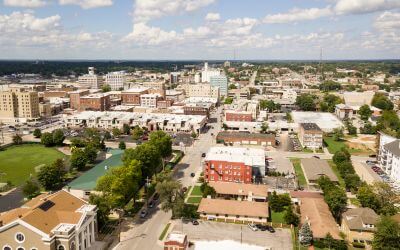Search for Other Treatment Facilities in Missouri:
- ASL or other assistance for hearing impaired
- Access to Recovery Voucher
- Buprenorphine Treatment Centers
- Drug and Alcohol Detox Treatment Centers
- Dual Diagnosis Treatment Centers
- General health services
- Halfway Houses
- Hospital Inpatient Care
- Long Term Drug Rehab and Substance Abuse Care
- Medicaid
- Medicare
- Mental health services
- Methadone Detoxification Treatment Centers
- Methadone Maintenance Treatment Centers
- Military Insurance (e.g.VA, TRICARE)
- Outpatient care
- Partial hospitalization or day treatment
- Payment assistance (Check with facility for details)
- Private health insurance
- Self Payment
- Short Term Drug Rehab and Substance Abuse Care
- Sliding fee scale (Fee is based on income and other factors)
- Spanish
- State Financed (other than Medicaid)
- Substance Abuse Treatment Centers
- Substance abuse treatment services
- See all treatment centers in Missouri
- programs for addicted criminal justice clients
- programs for alcohol related criminal justice clients
- programs for clients with HIV or AIDS
- programs for gays and lesbians (LGBT)
- programs for men
- programs for people with a dual diagnosis (co-occurring mental and substance abuse disorders)
- programs for pregnant and postpartum women
- programs for seniors and older adults
- programs for women
- programs for young adults
- residential beds are available for clients' children
Statewide Substance Abuse Prevention Strategy and Help Available at Drug Treatment Centers in Missouri
In 2021, Missouri faced a significant public health crisis, with 2,155 overdose deaths recorded across the state. [1] This alarming figure translates to an age-adjusted rate of 36.5 overdose deaths per 100,000 people, highlighting the urgent need for effective interventions and support systems to address this escalating issue. The state’s substance abuse prevention strategy integrates various initiatives aimed at reducing the prevalence of substance abuse across the state. These include:
- Public awareness campaigns.
- Education programs for all ages.
- Collaborations between healthcare providers, law enforcement, and community organizations.
The strategy prioritizes the identification of high-risk populations and the distribution of resources like naloxone to prevent overdose deaths, fostering a proactive approach to drug abuse prevention.
For individuals struggling with addiction, Missouri drug treatment centers are equipped with the necessary tools to aid recovery. These facilities provide a range of services, from detoxification and therapy to long-term rehabilitation programs, each designed to cater to the unique needs of their patients. Exploring these facilities can be a crucial step for anyone seeking help to overcome addiction and rebuild a healthy, drug-free life.
Evidence-Based Polydrug Abuse Treatment at Kansas City Drug Treatment Centers

Polydrug abuse, the simultaneous use of multiple drugs, poses significant dangers as it increases the likelihood of overdose and complicates treatment strategies. This practice can exacerbate the side effects of each substance and create unpredictable chemical reactions within the body, leading to severe health risks or fatal consequences. For instance, the dangerous practice of mixing an opioid with a psychostimulant, known as a “speedball,” has been known since the 1950s to have deadly outcomes. This combination was linked to 12,676 deaths, or 18.8% of the 67,367 drug overdose deaths in the US reported in 2018. [2]
Drug treatment centers in Kansas City specialize in evidence-based approaches to tackle polydrug abuse. These facilities offer tailored treatment plans that address the complexities of polydrug dependence, employing a combination of behavioral therapy, medication-assisted treatment, and support groups. Anyone facing polydrug issues is encouraged to seek out these centers to access the comprehensive care needed for adequate recovery.
Fentanyl Addiction Prevention Program with the Help of Drug Treatment Centers in Springfield, MO

According to the National Institute on Drug Abuse (NIDA), between 2019 and 2021, drug overdose deaths increased, reaching over 106,000 in 2021. Deaths from synthetic opioids, mainly fentanyl, also rose, with 70,601 overdose deaths reported in that year. [3] Fentanyl addiction is particularly perilous due to the drug’s potent effects, even at low dosages, leading to a high risk of overdose. The addictive properties of fentanyl make it one of the most challenging substance dependencies to overcome, often requiring specialized intervention and continuous monitoring.
Springfield drug treatment centers have developed specific programs to prevent and treat fentanyl addiction. These programs emphasize both the medical and psychological aspects of addiction, providing patients with the necessary medical care to safely detox and ongoing counseling to address the underlying causes of their drug use. Individuals with fentanyl addiction are urged to consider these specialized programs to secure a supportive pathway to recovery.
Prescription Drug Addiction Detox at Drug Treatment Centers in St Louis

The sharp rise in drug overdose deaths involving prescription opioids, from 3,442 in 1999 to 17,029 in 2017, signals a dire public health crisis in the US that urgently requires intensified efforts and comprehensive support to mitigate the problem. [4] Detoxification from prescription drugs is a critical first step in overcoming addiction and can significantly improve one’s quality of life. It helps eliminate the body’s physical dependence on substances, clears the mind, and prepares individuals for further rehabilitation, which often includes therapy and skills development.
St Louis drug treatment centers offer detox programs specifically for prescription drug addiction. These centers provide a safe environment for detox under medical supervision, followed by comprehensive rehabilitation programs. Anyone looking to break free from prescription drug addiction should explore the options available in St. Louis for a thorough and supportive detox experience.
Opioid Overdose Awareness and Healing at Drug Treatment Centers in Columbia, MO

Overdose awareness programs are essential in educating the public about the signs of overdose and the immediate steps to take in such emergencies, which can save lives. Furthermore, these programs often advocate for the use of naloxone, a life-saving drug that reverses the effects of opioid overdoses.
Administering naloxone is crucial in suspected cases of opioid overdose. Here are signs that indicate the need to administer naloxone:
- Unresponsiveness or Inability to Wake: If the individual cannot be woken up by shouting their name or by physical stimulation like gently shaking or tapping, naloxone may be necessary.
- Shallow, Slow, or Stopped Breathing: Look for breathing problems. This could appear as shallow breaths, prolonged breathing, or no breathing.
- Small, Constricted “Pinpoint” Pupils: Opioid overdose often causes the pupils to become very small, even in dim lighting.
- Choking or Gurgling Sounds: These sounds may indicate that the individual’s airway is partially blocked.
- Blue or Gray Lips and Fingernails: The skin’s bluish or grayish color, especially on the lips and fingernails, suggests a lack of oxygen in the blood.
- Limp Body: The person may appear floppy or lifeless.
- Pale, Clammy Skin: The skin may feel relaxed and moist to the touch, appearing pale or ashen.
If you observe any of these signs and an opioid overdose is suspected, administering naloxone immediately can be life-saving while waiting for emergency medical help to arrive. Always call 911 when administering naloxone in case additional medical treatment is needed.
Columbia drug treatment centers not only focus on treatment but also emphasize overdose awareness as part of the healing process. By understanding overdose risks and prevention, individuals in recovery can protect themselves and others, fostering a community of awareness and support. Exploring these accredited facilities can provide access to vital resources and community support networks essential for recovery and relapse prevention.
Opioid Use Disorder Recovery at Branson Drug Treatment Centers

There’s a critical need for a national strategy to address the severe issue of drug addiction. Recent 2020 statistics reveal that just 13% of people with drug use disorders are getting any form of treatment. Even more concerning is that only 11% of those with opioid addiction receive one of the three proven medications that can help them stop using and support their recovery. [5] Recovery from opioid use disorder offers numerous advantages, including improved health, renewed relationships, and a better quality of life. Effective recovery programs address both the physical dependence on opioids and the psychological factors contributing to substance use, ensuring a holistic approach to treatment.
Drug treatment centers in Branson are equipped with specialized programs to aid individuals in recovering from opioid use disorder. These centers offer a combination of medical treatment, counseling, and support groups to help patients achieve long-term sobriety. Individuals struggling with opioid addiction are encouraged to reach out to these top-rated facilities for comprehensive care and support.
Find Recovery and Statewide Substance Abuse Prevention Strategy: Missouri Drug Treatment Centers
In 2022, Missouri saw 2,178 people die from drug overdoses, marking a 2.3% increase in deaths statewide compared to 2021. This rise was primarily concentrated in the Kansas City Metro Area.
- Overdose deaths among females rose by 5.5%, while the increase among males was just 0.9%.
- Racially, overdose deaths among Black Missourians increased by 5.5%, whereas they decreased by 1.5% among White Missourians.
- The St. Louis Metro was the only region that saw a decrease in overdose deaths among Black individuals, down by 6.7%.
- Fentanyl continued to be a significant factor, involved in 67% of all overdose deaths for the second consecutive year.
Moreover, the proportion of deaths involving stimulants, whether alone or combined with opioids, has continued to rise in the state. [6]
The statewide substance abuse prevention strategy in Missouri offers significant advantages by coordinating efforts across various sectors to reduce drug use and its consequences. This comprehensive approach includes enhancing public awareness, increasing accessibility to treatment, and strengthening community resources. Missouri drug treatment centers are integral to this strategy, providing crucial support and treatment options for individuals affected by substance abuse.
Take action towards recovery now. The team of addiction treatment experts in Missouri is ready to provide you with the care you deserve.
Help us help you rebuild a healthier life. Contact our team for expert addiction treatment.
Resources:
[1] Missouri Overdose Investment Snapshot – Centers for Disease Control and Prevention (CDC)
[2] Peppin JF, Raffa RB, Schatman ME. The Polysubstance Overdose-Death Crisis. J Pain Res. 2020 Dec 15;13:3405-3408. Doi: 10.2147/JPR.S295715. PMID: 33364823; PMCID: PMC7751289.
[3-4] Drug Overdose Death Rates – National Institute on Drug Abuse (NIDA)
[6] Missouri Statewide Overdose Mortality Information – MIMH Addiction Science